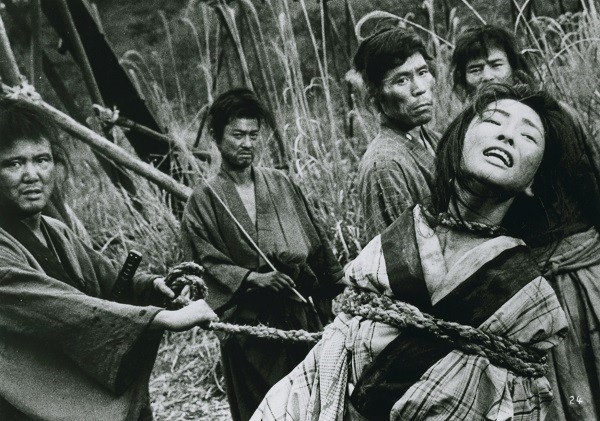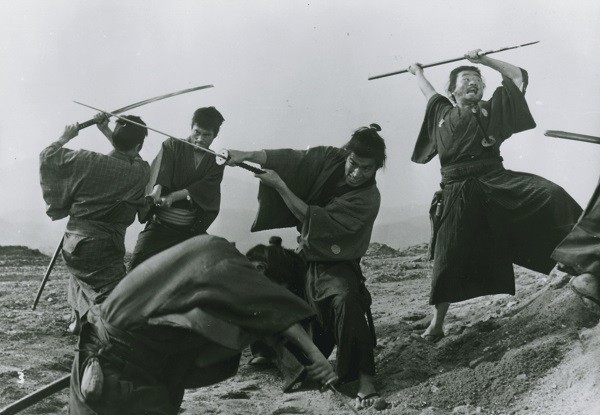Three Outlaw Samurai, 1964.
Directed by Hideo Gosha.
Starring Tetsuo Tamba, Isamu Nagato and Mikijiro Hira.
SYNOPSIS:
A lone wolf samurai (Tetsuo Tamba) comes upon a town where local peasants are oppressed by the tyranny of a town magistrate. They have taken the law into their own hands and he decided to join their cause.

There is a stark brutality which offsets the concise story telling in Hideo Gosha’s Three Outlaw Samurai. In this early example of the sword fighting genre, Tetsuo Tamba gives a towering central performance as an errant samurai who siding with some mistreated peasants. They have taken the daughter of a local magistrate hostage and are looking to use her for leverage. As far as set ups go things never get more complicated than that, yet Gosha builds something monumental from these humble beginnings.
Economically shot on location and under studio conditions Three Outlaw Samurai revels in archetypes which never feel lazy. There is the drunken samurai, a preening samurai who values self-interest over matters of honour and geishas that overcome personal prejudice to fall for our anti-heroes. Town magistrates and feudal lords are obviously villainous but never drift into caricature, while set pieces add a valuable dynamic to the story.

Restored to near perfection this tale of love, revenge and samurai swords is reminiscent of The House of Blue Leaves from Quentin Tarantino’s Kill Bill Volume I. There is no crazy eighty eight looking to cut down a lone samurai, but Tetsuro Tamba faces off against more than his fair share of nameless foes. Dialogue is excellent, performances across the board are exceptional if understated, while at times Three Outlaw Samurai takes on a Western vibe.
Violence is perpetrated in line with a code which only villains circumvent. Production design within the magistrate’s house and below in his lock up are excellent, while as a whole things never feel cheap. Filmed in glorious black and white contrasts pop while blacks are richly vibrant giving the film an authenticity. This may be the oldest of narratives which is pure good versus evil, but pathos mingles with emotional revelations seamlessly.

Admissions of guilt, tears of betrayal and an unwavering sense of loyalty turn archetypes into hero figures. Armies are faced, improbable odds overcome and these men leave a combination of hard justice and honourable victory in their wake. Lighting is subtle, shadows add dimension and music gives the emotional rabble rousing an extra dimension. At a little over ninety minutes Three Outlaw Samurai never outstays its welcome either, as the screen time flies by in a blur flailing blades and close quarter combat.
For those looking for a place to start in their cinematic samurai education Hideo Gosha’s first outing comes highly recommended. Not one frame is wasted in an attempt to showboat as Tetsuo Tamba and company chew scenery, deliver lone wolf justice and do so with honour to spare.
Flickering Myth Rating – Film: ★ ★ ★ ★ / Movie: ★ ★ ★ ★
Martin Carr











